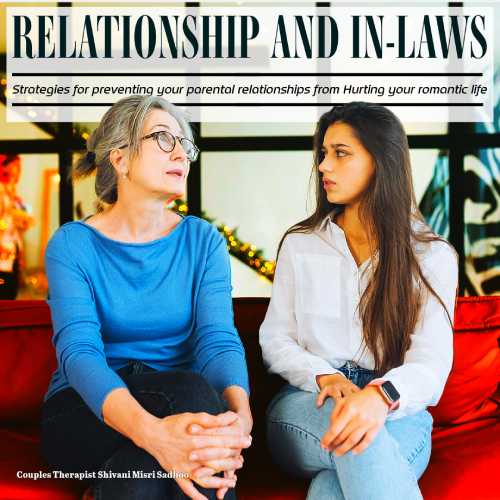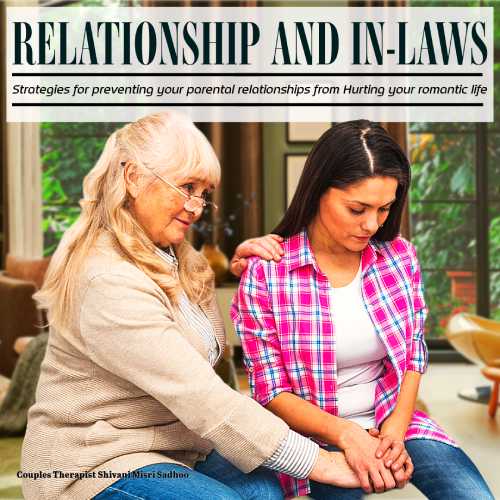Marriage is more than just a union between two lovers; it’s a merging of families, cultures, and traditions. When you take those sacred vows in front of the fire, you’re not only pledging your love to your partner but also weaving together two families, each with its own set of customs, values, and dynamics.
The idea of living with in-laws can stir up a myriad of emotions. For some, it’s an opportunity to strengthen family bonds and enjoy the support system that comes with extended family.
For others, it can be a potential minefield of conflict and tension. So, how does sharing your living space with your in-laws really impact your marriage?
Shivani Misri Sadhoo, a leading marriage and family therapist in Delhi and Gurgaon shares 5 ways to deal with the situation.
What are Some of the Challenges Faced?
According to Shivani some of the seen challenges are:
Controlling In-Laws
When in-laws are overly controlling—dictating living arrangements, and child-rearing choices, and reacting poorly to non-compliance—tension rises.
This issue intensifies if your spouse sides with them, adding pressure to your relationship. Addressing it promptly is essential to avoid escalating stress and conflict.
Violation Of Privacy
When in-laws frequently infringe on your privacy, it can cause unnecessary tension in your relationship. You may feel the need to set boundaries, but if your partner dismisses your concerns because it’s family, it can lead to frustration and resentment.
This lack of support might undermine the unity in your relationship, making you feel unsupported and isolated.
Being too Judgmental
It becomes incredibly frustrating when in-laws judge and criticize every move you make, as they often impose their own expectations on your newlywed life.
Their judgments about your career choices or parenting can erode your confidence and strain your relationship.
Being Manipulative
Sometimes, in-laws use guilt-tripping as a manipulative tool to control their child’s partner, making them feel inadequate or like they’re making poor decisions.
This tactic can cause significant strain on the relationship, creating a rift between you and your partner, especially if your partner is swayed by the guilt while you’re trying to resist. Such behavior fosters anger, resentment, and distance.
What are the Strategies to Deal with It?
Some of the best ways to deal with it are:
Honest Communication
It may sound cliché, but effective communication is crucial in any relationship, including those with in-laws. Responses to in-law issues often reflect past experiences, such as a woman’s protectiveness due to a close bond with her mother after an early divorce or a husband’s nervousness from a critical father.
Understanding each other’s backgrounds and fostering open, respectful dialogue—while addressing concerns calmly and empathetically—can prevent misunderstandings and emotional conflicts.
Address The Problem
Many a time, we often choose to ignore problems, but this approach isn’t effective, especially when dealing with issues involving your in-laws.
If their behavior is negatively affecting you and your relationship, pretending it doesn’t matter won’t make it disappear; in fact, it will only worsen over time, impacting both your personal well-being and your relationship.
Facing the issue directly, rather than avoiding it, will lead to a healthier, more balanced life.
Maintain Clear-cut Boundaries
Set clear boundaries early on and adhere to them consistently to maintain peace and sanity. When in-laws or others are given excessive leeway, it can quickly lead to chaos.
Be assertive in defining your limits on issues like finances, unsolicited advice, and personal space. Communicate these boundaries clearly and reinforce them regularly to prevent misunderstandings and conflicts.
Empathy
Being empathetic can ease the challenges of living with in-laws. By trying to understand their perspective, you may reduce their impact on your life. Harmony requires curiosity and empathy, allowing everyone involved to feel understood.
When people feel heard, they are more open to flexibility and change, creating a more peaceful and accommodating environment.
Keep Calm
When your in-laws make offensive comments, resist the urge to react impulsively. Instead, take time to cool off before addressing the issue. A brief pause helps everyone approach the situation more calmly and constructively.
Prioritize addressing significant issues over minor disagreements, and choose your battles wisely to maintain family harmony and your own peace of mind.
What to take out of this?
There is always a way to manage the complexities of living with in-laws and maintain a healthy marriage. By fostering honest communication, addressing issues directly, setting clear boundaries, practicing empathy, and staying calm, you can create a harmonious environment and strengthen your relationship.



















